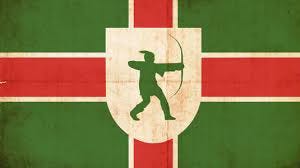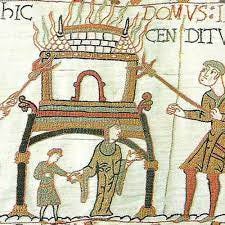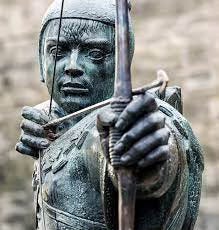In the December of our culture ward somewhere the secret seed, under the mountain, under and between, between the grids of the Ram’s survey when he squares the world-circle …
David Jones, The Tutelar of the Place
‘The day the country died.’ That was how October 14th 1066 – the date of the Battle of Hastings – began to be spoken of in the taverns and ale shops of England. It was a shattering loss, with the entire leadership cadre of the Anglo-Saxon state wiped out in a stroke. No suitable native leader with a plausible claim to be throne could be found. The Witan had no choice, therefore, but to offer William the mastery which he had already seized by courage, good fortune, and shrewd generalship.
It felt to the Saxons that the world had shifted on its axis. The bottom had fallen out of a whole way of being. Folk memories of Arthurian, Roman, and Celtic times receded ever deeper into the collective unconscious. The Holy Grail, Joseph of Arimathea, Brân the Blessed, Brutus the Trojan. All this lore seemed definitively lost now, retreating further still after Hastings from day to day thought and being. The great kings of England – Alfred, Athelstan, Edgar – had elevated the realm to the point where she almost glimpsed again the sacred glory. But the civilisation they had built had burned itself up in a single afternoon. Very few Englishmen consciously grasped the full extent of the spiritual and imaginative wasteland they now inhabited. But their souls and bodies understood full well. The very touch and texture of the earth felt different. Home was no longer home.
So began the exodus. Many relocated to Scotland, Ireland, Wales, or France. Others sailed to Scandinavia and beyond. Princess Gytha, for instance, King Harold’s daughter, travelled to Kiev and married Vladimir II, the Grand Prince of Rus’, bearing him a son (named after his English grandfather) who went on to found the city of Moscow, the future Third Rome. But it was the Second Rome – Constantinople – that was the most popular destination. There the Saxons could take up the Emperor’s service and fight against the Turks in the East and the hated Normans in Italy. They could also continue to live in the ritual and spirit of the Old English Church. They built a mini-cathedral, in fact, in the heart of the city, where a lamp burned perpetually before the icon of St. Augustine of Canterbury.
Their spiritual and material needs were thereby met, but this was emphatically not the case for those left behind. Rebellions broke out in several places, but they were crushed with such ferocity that it was crystal clear to everyone that the old order had passed into history.
What became the British Empire began with the Norman Conquest, and the people of England were the first to be colonised. The Normans were a creative, energetic race and in time great things were achieved in numerous spheres – religion, law, education, political theory, military affairs, and the arts. England became known as Mary’s Dowry, a shining diadem at the core of European Christendom. Her monasteries, cathedrals, convents, and abbeys gave the land real spiritual ballast and integrity. A wall of prayer, it seemed, kept falsity and evil at bay, and gave space for goodness and beauty to shine.
All this was a long time coming though, and by the time of Richard I (1189-1199), the balance of power between Norman gentry and Saxon natives remained unchanged. The Norman kings themselves were not the problem. They were hard men, but generally fair. The issues lay with those beneath them – the barons – who did everything they could to disenfranchise the English and divest them of their property and livelihoods. When Richard set out for the Holy Land to lead the Fourth Crusade, his brother, John Lackland, was declared Prince Regent. He immediately joined hands with the barons and quickly set about stealing land and money from those who did not belong to the Norman ruling caste. With the King, the ultimate guarantor of law and justice, abroad, the people appeared to have no-one left to turn to.
No-one save Robin Hood, that is. He emerged out of nowhere, as if in response to a collective yearning and a deep, primeval call. This half-Saxon, half-Norman noble turned his back on a life of comfort and status to fill the royal gap that Richard’s absence had created. He unfurled his standard in the hiddenmost glade of Sherwood Forest and blew a loud, potent note on his bugle – wild, high, and fierce – and the best and bravest in the Midlands laid down their tools and rallied to his side. They understood the summons. They had been waiting for it for decades. And they knew instinctively where to find him and how to navigate the secret paths.
On they came – Will Scathlock, Maid Marian, Friar Tuck, Little John, and three-score more – first-rate archers all, with a handy knack for guerrilla war. They clad themselves in Lincoln green, and for fifteen years, until John finally ran them down, they harried and harassed their overlords in a series of targeted, pin-point campaigns.
Robin’s strategy was measured and contained. He had no illusions about seizing the crown or restoring the Anglo-Saxon line. He did what he could with the companions that he had, and in doing so turned them into legends and exemplars. He pilfered the pockets of the barons and their lackeys, focusing particularly on the Sheriff of Nottingham and the corrupt Abbots of Fountains Abbey and St. Mary’s, Doncaster. He used the proceeds to feed and clothe the poor – not to foment revolution but in the name of the King and Tradition and the age-old, God-given rights of the English folk.
Bards will sing of Robin’s deeds till the Day of Doom and beyond. John Lackland is little more than a historical footnote today, while Robin lives on in the hearts and minds of the free. He showed us the proper stance to take vis-à-vis the inhuman spirit of mechanisation and quantification. To remain sovereign and independent in thought, word, and deed, even on or after – especially on or after – ‘the day the country died.’





